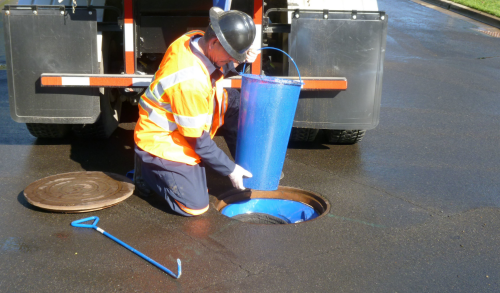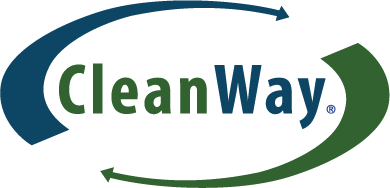
Fitesa Surpasses Washington Department of Ecology Stormwater Quality Standards
by Linda Barney, Barney & Associates
Fitesa is a leading manufacturer of spunbond, spunmelt, carded and airlaid nonwovens. The company’s headquarters and operation units are strategically located around the globe in North America, Europe, South America and Asia. Global headquarters are in Simpsonville, South Carolina.
The process of producing nonwoven fiber and fabrics involves taking resins of polypropylene, polyethylene pellets or cornstarch and melting the resins to make nonwoven fabric. The Fitesa Washougal site has a long history in the area, opening in 1982 as part of Crown Zellerbach and the nonwoven fiber technology was developed there. The company is now the largest division of parent company Petropar S.A. located in Brazil. While the Washougal, Washington site is the smallest Fitesa plant, it has flexible manufacturing capabilities and also does trial work for products. Fitesa’s Washougal site makes large rolls of non-woven resin fabric that are used mainly in baby diapers, adult diapers, and feminine hygiene products; the Washougal site also creates landscape fabric, household and bedding items, as well as medical face masks and disposable medical gowns.
PROBLEM
The state of Washington has stringent regulations relating to stormwater discharge, pollution and water quality. Fitesa is located adjacent to the William Clark state park, stormwater from the plant drains into the nearby Gibbons Creek which then empties into the Columbia River. Fitesa is required to have a Washington State Industrial Stormwater General Permit and measure stormwater from the plant for turbidity, PH balance, oil sheen and various minerals.The Fitesa site borders the banks of the Columbia River. Because of its location near a major waterway, Fitesa is required to meet various air and water pollution regulations. They are required to meet air emission permits through the Southwest Clean Air Authority. Fitesa captures manufacturing fumes using a CVM Fume Eliminator System. JD Hisey, Fitesa Washougal Plant, Continuous Improvement Manager, indicates the Fitesa plant produces very low air emissions and is in total compliance with regulations. The plant is also in compliance with sewer regulations.
SCOPE OF THE FITESA STORMWATER POLLUTION
Fitesa consistently tests stormwater but experienced problems meeting the stormwater standards for zinc and copper discharge. Zinc is used in galvanized metal, shingles, finishes in paints, and car tires—zinc is everywhere. Copper is used in items such as in brake linings and pressure treated lumber. At sites near heavily traveled roads, zinc, copper and lead get passed into the air and deposit on roofs and other surfaces. During the next rain event, pollutants that comprise the environmental deposition become a component of the site’s stormwater runoff.
FITESA SEEKS STORMWATER DISCHARGE SOLUTION
Washington state stormwater discharge limits on zinc is 117 μg/L and copper is 14 μg/L. Hisey notes that Fitesa had continuous problems meeting zinc stormwater discharge levels and had occasional spikes in the amount of copper. On various occasions, the zinc level varied between 175 to 500 μg/L and once reached 1,000 μg/L. Fitesa has galvanized roofs and 10 galvanized 50 foot silos that probably contributed to the zinc discharge problem as well as the incoming hopper railcars that deliver raw materials. Copper spikes probably relate to truck deliveries and copper in brake linings.
“Recently, Fitesa maintenance staff painted all the metal silos and cleaned metal roofs and stairways they suspected were causing problems. Unfortunately, that didn’t seem to really move the needle on the excessive zinc discharge,” says Hisey. So, Fitesa began looking at options to deal with discharge compliance. One option was a big filtration system which could cost several hundred thousand dollars. Hisey consulted with PBS Engineering and Environmental, a company that performs air and water permitting and sampling. PBS recommended CleanWay as an affordable, pragmatic solution to their stormwater pollution issues.
INTRODUCING CLEANWAY
Across the river from Fitesa in Portland, Oregon, CleanWay offers a wide range of solutions to remove pollution from stormwater, process and industrial wastewater. CleanWay’s experience with environmental services goes back more than twenty years when CleanWay President, Steve McInnis grew the company out of the stormwater services industry and into stormwater products. Because of this background, CleanWay approaches product development with a focus on how products are serviced and maintained, ensuring ease-of-use for customers. CleanWay Storm Clean® products include catch basin inserts, absorption booms, curb inlets and variant stormwater filtration systems. CleanWay’s patented MetalZorb® media is a non-toxic, biodegradable, organic polymer that is ideal for reducing, removing and recovering dissolved heavy metals and metallic ions in applications where rapid capture is required. The table shows CleanWay products and pollutants each product targets.
CleanWay and Fitesa evaluated the Fitesa site and sub-system and determined that most of the pollution was on the south side of the building. The 80/20 stormwater rule came into play, meaning 80 percent of the problem stemmed from 20 percent of the site. High-traffic areas or concentrations of materials or activities often cause 80% of problems such as those seen at Fitesa, along with site characteristics such as neighboring buildings, water flow, wind direction and type and condition of finishes on structures.
CLEANWAY SOLUTIONS

There were seven manholes on the south side of the Fitesa building and in the shipping truck bays. CleanWay installed a Catch Basin filtration system containing a sediment pre-filter and metals main filter in each of the manholes. The filtration system stops trash and debris, sediment and TSS, oil and hydrocarbons, and dissolved metals at the source. Fitesa staff usually change the pre-filter once a month and the main metals filter once every 3 months (site conditions and weather determine how often filters need to be changed). Initial problems with alignment of the filters were quickly resolved by Fitesa and CleanWay. They also added a CleanWay downspout filter for water coming off the roof and re-routed stormwater off a side building directed to a manhole with a CleanWay filter.
MetalZorb® non-toxic, biodegradable, organic polymer absorbs metal from stormwater
Fitesa also uses CleanWay’s MetalZorb® non-toxic, biodegradable, organic polymer to quickly absorb metals from stormwater. MetalZorb is a durable media that remains effective across a wide range of pH and can bond with dissolved metals in either anionic or cationic states. Once used, the MetalZorb media can be disposed of as solid waste or valuable metals can be recovered. Occasionally, Fitesa uses a CleanWay Adsorption Boom for filtration in areas such flooding in parking lots.
Since installing the CleanWay filtration system, Fitesa’s stormwater compliance issues have been solved. We have had a long-term problem with zinc and copper discharge compliance, but the CleanWay solution has fixed our pollution problems at an affordable price. – JD Hisey, Fitesa Washougal Plant, Continuous Improvement Manager
CLEANWAY MEETS FITESA’S STORMWATER NEEDS
Hisey reports that Fitesa is happy with the solution and level of support provided by CleanWay. Matthew Moulton, CleanWay General Manager, made various trips to Fitesa to determine specific needs of the site and to support any problems or special needs.
“Since implementing CleanWay solutions, the stormwater discharge levels for zinc and copper are within or below accepted standards.” The accepted zinc discharge standard is 117 μg/Liter and Fitesa’s discharge levels for zinc were 114, 106 and 87 μg/Liter. Copper levels are below accepted levels of 14 μg/Liter; copper discharge readings were 4, 2 and non-detectable. In addition, turbidity readings have also been reduced.
“Our implementation of the CleanWay solution is now in the Stormwater Pollution Prevention Plan that Fitesa sent to the State of Washington. CleanWay technology is less expensive than other stormwater solutions and is effective and easy to maintain,” says Hisey.
For more information, call 800.723.1373.
